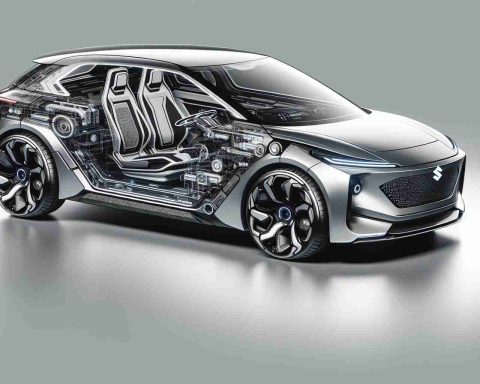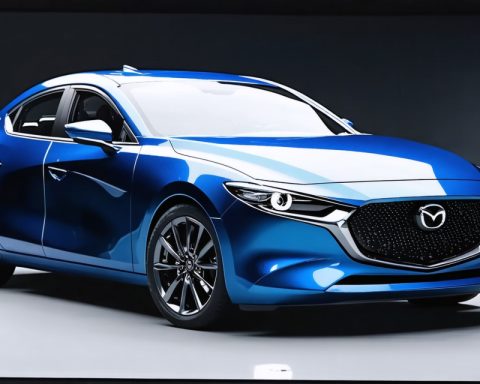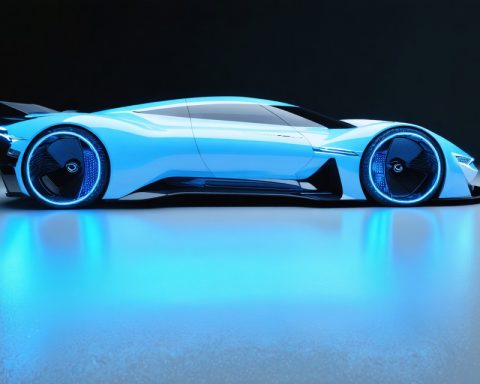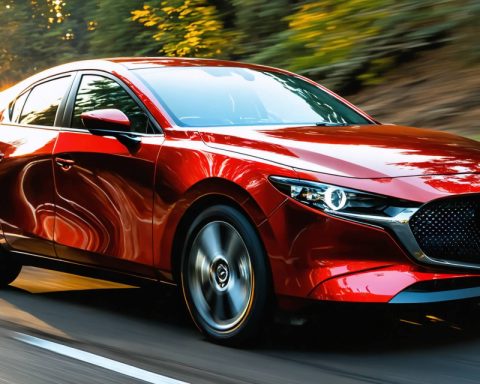- Tesla is entering the Saudi Arabian market, a region traditionally dominated by oil, marking a strategic expansion with an event on April 10.
- The company plans to showcase its electric vehicles and unveil advancements in autonomous driving and robotics, including the Cybercab and humanoid robot, Optimus.
- Despite this move, Tesla faces global challenges with declining sales and increased competition, especially from China’s BYD and a decreasing market share in Europe.
- In the U.S., political controversies surrounding CEO Elon Musk and new FBI investigations add to the company’s challenges.
- Tesla’s stock value has dropped by nearly 40%, reflecting investor concerns and the dynamic nature of the electric vehicle sector.
- The Saudi market entry is both a business expansion and a testament to Tesla’s commitment to an electrified future in a complex global landscape.
Tesla, the iconic beacon of electric innovation, is embarking on a bold journey into Saudi Arabia, a land where oil reigns supreme and electric vehicles are just a whisper in the marketplace. The company announced an eagerly awaited event on April 10 in the heart of the kingdom, promising a firsthand glimpse of its futuristic vision. Not only will Tesla showcase its sleek electric vehicles, but it will also unveil an exhilarating blend of autonomous driving with its Cybercab and the intriguing presence of its humanoid robot, Optimus, signaling a new era in artificial intelligence and robotics.
Yet, beneath the gleaming surface of this new market entry lies a complex tapestry of global challenges and controversies. Tesla’s decision to dive into the Gulf’s largest economy comes as its worldwide sales navigate turbulent waters. The pioneering carmaker experienced an unprecedented dip in annual sales—a first since its public inception—signaling challenging times.
In China, the automotive colossus continues to grapple with fierce competition from emerging homegrown giants like BYD, which has not only eclipsed Tesla in sales but has also raced ahead with cutting-edge charging technology, capable of adding an astounding 250 miles in mere minutes. Europe, too, reflects a cooling enthusiasm for Tesla, with sales plunging by a staggering 40% in February alone.
Back home in the United States, Tesla’s saga takes on a political hue, as CEO Elon Musk’s controversial stint in government positions has sparked both protests and vandalism. The announcement of a new FBI task force highlights the increasing tensions, as public sentiment twists and turns against the backdrop of Musk’s polarizing decisions.
To add to the pressure, Tesla’s market value is wavering, with stocks plummeting nearly 40% since their peak, partially driven by investor unease and the shifting dynamics of the electric vehicle landscape.
Ultimately, Tesla’s foray into Saudi Arabia offers a paradox—entering a market steeped in oil dependency whilst addressing global challenges and controversies. The launch represents not just a business move but a bold declaration of Tesla’s enduring commitment to driving the world towards an electrified future, despite the stormy weather on its horizons.
As Tesla motors towards new frontiers, it serves as a reminder of the ever-evolving dance between innovation and the unpredictable currents of global affairs.
Tesla’s Middle East Expedition: Triumph or Turbulence?
Tesla in Saudi Arabia: A Paradigm Shift in the Electric Vehicle Market
Tesla’s recent venture into Saudi Arabia could redefine the narrative of electric vehicles (EVs) in the region. In a country historically dominated by oil, Tesla’s entry is much more than a business expansion; it is an audacious attempt to catalyze the transition towards green energy in one of the world’s most oil-dependent economies.
Why is Tesla Eyeing Saudi Arabia?
1. Strategic Market Expansion: Saudi Arabia is part of Tesla’s strategic expansion into untapped markets. With significant economic diversification efforts like Vision 2030, aimed at reducing Saudi dependence on oil, Tesla is well-positioned to contribute to this transformation.
2. Growing Demand for EVs: Environmental consciousness is growing worldwide. Saudi Arabia has already initiated projects like NEOM, a smart city with sustainable energy, indicating a shift toward clean energy use that Tesla can capitalize on.
3. Government Initiatives: The Saudi government is investing heavily in infrastructure to support EV adoption, offering incentives for both manufacturers and consumers. This aligns well with Tesla’s mission of accelerating the world’s transition to sustainable energy.
Tesla’s Global Challenges: The Competitive Landscape
Even as Tesla extends its footprint, the company faces mounting challenges:
– Chinese Competition: Companies such as BYD and NIO have rapidly advanced their technology and manufacturing capabilities, offering robust local alternatives to Tesla’s lineup.
– European Market Decline: European buyers are increasingly turning to other EV manufacturers, affecting Tesla’s stronghold. Efforts to counteract this involve ramping up production and introducing more affordable models.
– US Market Dynamics: Political controversies surrounding CEO Elon Musk, coupled with rising competition from companies like Rivian and Lucid Motors, complicate Tesla’s positioning.
Real-World Use Cases and Market Trends
– Demand Forecast: The International Energy Agency (IEA) predicts that global electric car sales will continue to grow, aided by policies promoting low-emission vehicles. Tesla’s entry into new markets is crucial for maintaining its growth trajectory.
– Innovative Features: Tesla’s advancements in autonomous driving technology and artificial intelligence, as embodied by its Cybercab and humanoid robot Optimus, are critical differentiators. These technologies have the potential to shape future mobility solutions profoundly.
How-To Leverage Tesla’s Innovations
1. Utilize Tesla’s Autonomous Features: Users can maximize Tesla’s AI-driven technologies to enhance road safety and driving comfort.
2. Investing in Sustainable Infrastructure: With Tesla’s Supercharger networks and energy solutions, businesses can integrate sustainable practices into their operations.
Insights, Reviews, and Future Directions
– Technology Reviews: Independent evaluations, like those from Consumer Reports and JD Power, frequently praise Tesla for its advanced technology but often criticize fit and finish.
– Future Predictions: Analysts forecast that Tesla will focus on leveraging artificial intelligence not only in vehicles but across diverse applications, from energy management to robotics.
Recommendations for Potential Buyers and Investors
– For Consumers: Evaluate Tesla models based on personal driving needs and available incentives in your region before purchasing. Consider the long-term cost savings from reduced fuel and maintenance costs.
– For Investors: Monitor Tesla’s stock with an eye on geopolitical developments and advancing technology. Diversifying across different markets can mitigate risks associated with regional volatility.
Conclusion
Tesla’s expansion into Saudi Arabia is emblematic of its commitment to global market penetration while facing competitive and political challenges. As Tesla navigates these complexities, it remains at the forefront of catalyzing the transition to sustainable energy, despite enduring significant global scrutiny.
For more insights into automotive innovation, visit the official Tesla website.













